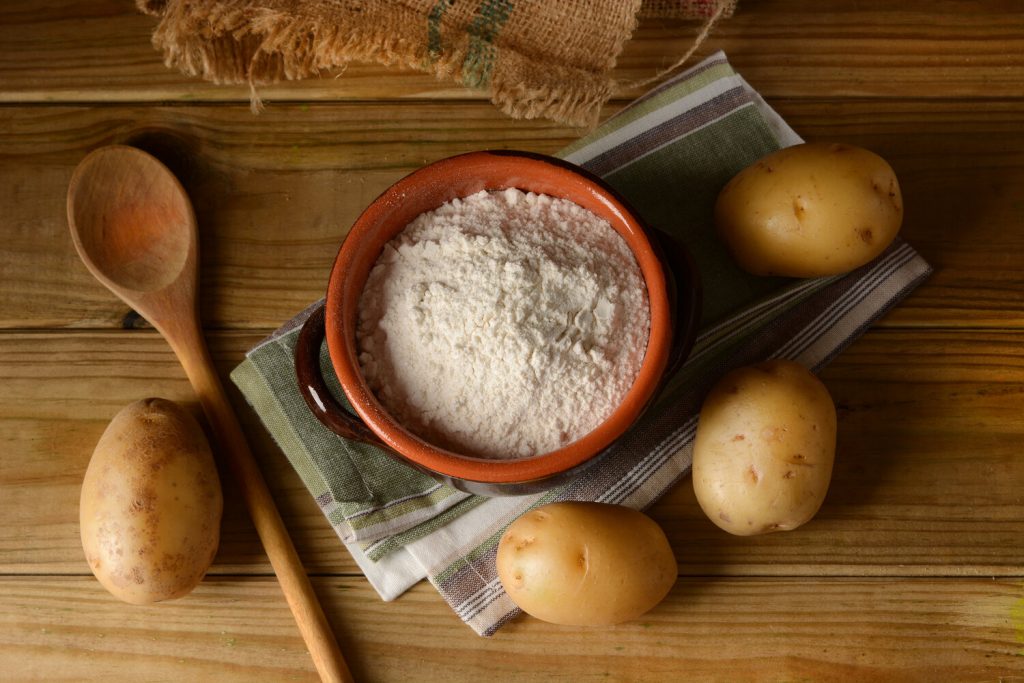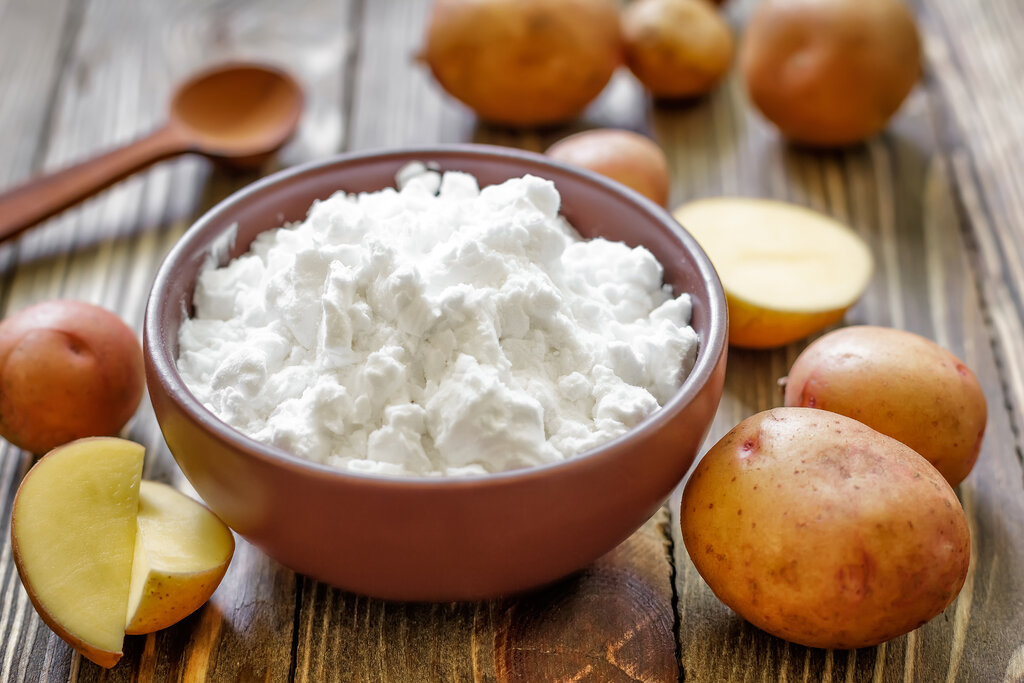
Looking for potato starch substitutes? Potato starch is a culinary wonder and a true reliable kitchen buddy. And like most starches, it serves its purpose brilliantly. You can use it in creating gluten-free recipes for baking or add it to your batter when frying. Potato starch is readily available in your local groceries and supermarkets. You can also order online in the safety of your home.
But, if you’re a home cook, you’d know that potato starch runs out really fast. What do you do when you run out of it while cooking in the kitchen? Don’t sweat it! As with other foods, there are substitutes for potato starch that you can use without causing any cooking mishaps. Read on to find out what are some that you may already have in your pantry.
What Is Potato Starch?
As the name suggests, potato starch is the starch extracted from potatoes. It’s white in color, odorless, and has a neutral taste! It is a common food additive and thickening agent. It is also commonly used in desserts and as a batter for frying. And because potato starch lacks flavor, it’s very adaptable and great for imparting other tastes to your food.
Despite its name, not all potatoes are used to make them. In fact, potato starch is made specifically from cull potatoes – waste potatoes that are deemed unsaleable. Starch manufacturers wash, peel, and then pulp them to produce a large batch of potato starch. This starch then undergoes a drying process that turns it into a white, powdery substance.
Some of you may be wondering, is potato starch gluten-free? Yes, it is! So if you are on a gluten-free diet or have gluten allergies, potato starch is safe for you to consume.
- Potato starch can significantly help improve digestion and colon health. It can also help improve weight loss by making you feel full for a long period. Just be mindful that too much of this may also cause bloating and flatulence. As always, moderation is the key.
What Is Potato Starch Used For?
Potato starch has many uses in cooking. Because of its qualities and flavorless taste, it can quickly adapt to any dish, making it versatile and almost an invisible dish saver.
You can use potato starch for the following purposes:
- Thickening agent – Potato starch is very water-absorbent— making it a great thickener for your favorite soups, gravies, and sauces.
- Frying – Potato starch is a great ingredient in making batter for frying. It has larger granules compared to other starches so the final product may be slightly rigid compared to others, but still crunchy.
- Baking – It can also do wonders in your favorite baked goods. Aside from improving crispness, it can also give your baked goodies a delicate texture. But be mindful when using this because too much potato starch can result in a crumbly and dry baked product. It is usually combined with other flours or starches when used in baking.
12 Potato Starch Substitutes You Can Use

What’s a good substitute for potato starch? It’s essential to know the different alternatives since they can save you the trip to the grocery store. Better yet, some of these are common pantry ingredients that you might already have! With that, we listed some of the best options you may find in your pantry if you are in quite of a kitchen pickle.
Cornstarch
Cornstarch is another gluten-free wonder and an amazing potato starch substitute as they are both starches that can be used similarly. It is oil absorbent, thus, giving your fried food a crispy outer shell just like when you are using potato starch. Cornstartch is also an excellent alternative for baking and thickening purposes as well. In contrast to potato starch, cornstarch is made from corn kernels, giving it a slightly yellow hue and an underlying sweetness.
Just be mindful that when using cornstarch as a thickener, it’ll give your dish a more gel-like viscosity that is thicker than the usual consistency of potato starch. And unlike potato starch, it has a relatively high heat tolerance. That is why we recommend incorporating cornstarch slurry at the beginning of cooking.
When using as an alternative, follow the 1:1 ratio of cornstarch to potato starch.
Arrowroot Powder
Sharing several similarities — from their odor, taste, and even their large-grained starches, arrowroot powder is also an excellent potato starch substitute. To prevent confusion, arrowroot powder is the same thing as arrowroot starch and arrowroot flour, so any of these in your pantry will work just fine.
The best thing about arrowroot powder is that it has low heat tolerance, so it thickens quickly just like potato starch. So, if you are planning to make sauces, arrowroot powder is the ideal thickener to use. It will give your sauce that perfect glossy and silky consistency.
However, bear in mind that arrowroot powder is not recommended for dairy-based sauces. And when using it in baking your favorite baked goodies, remember that it is on the drier side than potato starch, so make sure to follow proper measurements when using it.
As a substitute, you can use 2 teaspoons of arrowroot powder for every 1 tablespoon of potato starch.
Tapioca Starch or Tapioca Flour
Next on the list, we have tapioca starch or tapioca flour, also known as cassava or yuca starch. This potato starch alternative is made from pounded cassava roots native to Central and South America.
Tapioca starch or flour is an impressive thickening agent and can make great gluten-free bakes too. When using as a substitute thickener, you may use equal parts of tapioca starch to potato starch ratio. But when baking, we recommend using 25 to 50% more than what the recipe asks. You just have to adjust the amount of the flour-like ingredients so that the total volume remains the same.
READ ALSO: What is Yuca?
Potato Flour
While potato starch is a flavorless plain powder, potato flour is different. The latter is much more nutritious, containing fibers, protein, and an underlining earthy flavor. That is why we suggest using this as a potato starch substitute when cooking savory dishes like creating your pizza crust, making cheese nips, or baking a baguette. Follow a 1:1 ratio when using this as a substitute.
Use Instant Mashed Potato
Instant mashed potato is something that most, if not all, have in their kitchen pantry. After all, instant mash potatoes make one of the best comfort food. But, what most do not know is that it can also be a potato starch alternative! You just need to grind your instant mashed potatoes using a food processor until you get a very fine powder.
You can now do a 1:1 swap with this potato starch replacement, and add it to your batter when frying, or use it as a thickener for your sauces. Who knew an instant mashed potato could be a lifesaver like this?
Rice Flour
Another excellent substitute for potato starch is rice flour. You can use regular rice flour when making tempura batter for your fried dishes and as a thickener for your sauce, gravies, and fillings. Regular rice flour is usually made of ground long or medium-grained rice. However, there are also rice flour variations made from short-grained rice that also serves as a great alternative for potato starch.
- Glutinous rice flour – This is also known as sweet rice flour. Glutinous rice flour is from grounded rice grains used in making sticky rice. It has an underlying sweet taste compared to potato starch, making it a great alternative in baking or creating dessert pieces. It gives your dessert a chewier texture compared to potato starch. As an alternative, use a 1:1 ratio of glutinous rice flour to potato starch.
- Mochiko – Mochiko or mochigome komugiko (Japanese glutinous rice flour) is from Japanese sweet rice that is washed, dried, and milled to produce a powdery texture. Different types of glutinous rice flours, both in Japan or globally, differ depending on how they are prepared and milled. You can use mochiko as a potato starch alternative in creating desserts as it has an underlying sweetness but is relatively bland and tasteless. Like potato starch, it is also gluten-free. As a substitute, use mochiko according to the amount of potato starch asked from the recipe.
Coconut Flour + Other Potato Starch Alternative
Unlike other alternatives mentioned, use coconut flour as a potato starch alternative when creating desserts and sweet baked products. It is because it has a sweeter taste that may ruin the flavors if used in other dishes, especially savory ones.
When using this potato starch alternative, we suggest that you combine coconut powder with other flour or starch alternatives, like almond flour and tapioca starch, to achieve the desired quantity of potato starch. Use a ratio of 1:6 of coconut powder to other starch or flour to avoid an overly flavored dish.
Water Chestnut Flour
Water Chesnut flour is another substitute for potato starch that you can use as a thickener. As its name, it is made from grounded water chestnuts. However, note that despite having flour on its name, it is actually considered a starch.
Water chestnut flour has a sweet and slightly smokey flavor that you can use to your advantage. When adding as a thickener, we suggest that you dilute it in water to create a slurry and slowly add it to your dish until you achieve your desired consistency.
Wheat Flour
Wheat flour is not the best alternative, but it still does the job. When using this ingredient, add it slowly to your dish as it clumps easily. As a substitute, you may use it as a thickener. Use twice the amount of potato starch required in any recipe.
Also, bear in mind that wheat flour is not gluten-free. Do take note of this especially if you like cooking for a specific group of people with health conditions or diet to consider.
Rice Starch
Rice starch is made from broken grains of white rice and is another potato starch substitute that you can use. Like potato starch, it also has a white powdery appearance with a neutral flavor. Rice starch has no protein fraction so it is also gluten-free.
This replacement works well as a thickener for soups and gravies. Just add this gradually to your dish until you achieve your desired consistency.
Quinoa Flour
When all else fails, try quinoa flour! It is made from ground quinoa seeds, and though it might not be the best and highly recommended alternative for potato starch, it’s the best final resort when frying or baking. A downside to this is the bitter aftertaste it provides, so use it lightly.
Ground Matzo
Ground matzo is a cracker-like bread, made of water and flour, which is part of traditional Jewish cuisine. It is the least suggested potato starch substitute as it is a very liquid absorbent.
At best, you can use it in frying, just like breadcrumbs, resulting in a crispy fried dish. You can also grind it using a food processor and add it to your dish until you achieve the desired thickness of its sauce or gravy.











